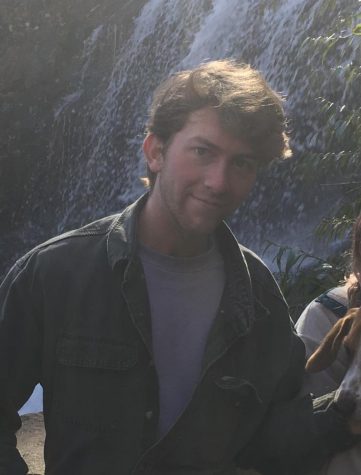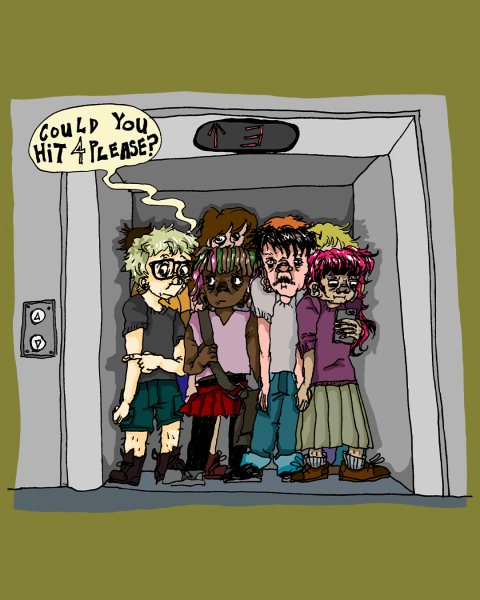Advocating for App State
A new political action committee prompts questions on university, town relationships
November 2, 2021
The accusations
App State has been accused of improper political behavior by multiple community members.
On Oct. 11, senior political science major Adam Zebzda requested the university investigate the relationship between a new political action committee, Appalachian PAC, and App State in a letter to board of trustees chairperson Kimberly Shepherd and Chancellor Sheri Everts.
PACs, political action committees, are organizations that obtain funds intended to support or oppose political candidates or legislation, according to the Federal Election Commission.
Appalachian PAC states on its website it is non-partisan and its goal is “supporting local business growth and university prosperity for the betterment of our community.”
Zebzda also asked for the investigation of the presence of two BOT members at a meeting hosted by Appalachian PAC.
BOT member Tommy Sofield and BOT Vice Chair Mark Ricks attended Appalachian PAC’s Sept. 16 launch event. Zebzda said he believes BOT members should be free to engage in political activity as private citizens but said Sofield and Ricks’ positions as BOT members indicate they are not acting entirely on their own behalf.
“I’ve been involved in Boone politics long enough to know that coincidences don’t really exist when it comes to local matters,” said Zebzda, Boone Board of Adjustment member.
The Appalachian obtained a university letter dated Oct. 12 drafted by the university’s deputy general counsel Toussaint Romain in response to Zebzda. The letter denied any connection between Appalachian PAC and App State, adding that the presence of BOT members Sofield and Ricks at the PAC’s launch event did not violate any UNC school system regulations or state laws.
Sofield and Ricks were photographed at Appalachian PAC’s launch event Sept. 16. The pictures were posted to the PAC’s Facebook page and then subsequently removed. Zebzda addressed their presence in his letter to the university, suggesting the BOT members may have violated North Carolina General Statutes §126-13 and or UNC Policy 300.5.1.
These regulations prohibit state employees from engaging in political activity while “on duty” or during any other time they are paid by the state. The UNC System policy uses similar language to the same effect. Both sets of regulations also prohibit employees from using the authority of their position to secure support for a particular political candidate.
In the university’s response letter, Romain wrote that BOT members are not App State employees. He continued, writing, “even if they were,” they were free to exercise their political rights as private individuals.
Zebzda said BOT members shouldn’t be part of a PAC fulfilling their “personal goals” and the goals of App State, which they promote in an “official capacity,” while exercising their political rights as private individuals.
“In my opinion, if you’re a trustee, you can’t really wear multiple hats,” Zebzda said.
Anna Oakes, App State media relations specialist, wrote in an email that App State has no affiliation with Appalachian PAC.
Oakes also addressed Sofield and Ricks’ attendance of the Sept. 16 meeting, writing that board members are required by law to disclose any conflicts of interests or the appearance of a conflict of interest. She said, according to the State Government Ethics Act, board members must recuse themselves from BOT discussion and actions that relate to any conflicts of interests.
“We have no concerns about the ethics of our volunteer board members,” Oakes wrote.
Appalachian PAC has raised $25,379.08 as of Nov. 1, according to the state Board of Elections. Two of the largest donations came from BOT members Sofield and Ricks, both donating the maximum amount of $5,600. Brian Tracy, former App State senior associate athletics director for development, also donated $5,600.
Zebzda cited writing by J.W. Williamson, creator of the blog WataugaWatch, in his letter to the university. Williamson was an App State English professor from 1970 to 2000.
Williamson *believes Appalachian PAC was created to elect candidates who will assist the university in gaining new zoning designations. These changes would advance the personal monetary interests of local real estate developers and expand App State’s campus.
“I don’t wanna see this town become merely a campus. I love that campus. I worked there for 30 years. I love ASU, but ASU is sometimes not a good neighbor,” J.W. Williamson said.
Ricks and Sofield could not be reached in time for publication.
The candidates
Appalachian PAC endorsed Benjamin Ray, Eric Woolridge and Edie Tugman for town council and Tim Futrelle for mayor, Oct. 13.
Woolridge wrote in an email that for App State to be “truly prosperous,” it must have a strong relationship with the Town of Boone. However, he wrote that he wants “very limited” expansion of App State’s campus.
Woolridge wrote that he has not accepted any money from Appalachian PAC. He continued that Appalachian PAC has placed ads on his behalf but that he has no coordination with them.
“It’s unfortunate that this organization has become such a distraction — it’s in the outer orbit of my campaign,” Woolridge wrote.
Woolridge is president of Designation by Design, a design firm that partners with towns, counties and states to design and improve “built environments.”
Ray told the Watauga Democrat he would like to see the improvement of App State’s “current real estate holdings for their use and development.”
He also wants to lease space owned by App State “to members of the community and maximize the many facilities that the University has to offer,” according to the PAC’s website. Ray is the owner of Client First of the High Country, a realty company. He also owns multiple rental real estate properties.
Ray was unavailable for comment at the time of publication.
Futrelle’s experience in “efficiency and sustainability” are important for the development of Boone’s projects, such as the Howard Street development, according to Appalachian PAC’s website.
Futrelle is App State’s food services supervisor for Rivers Street Cafe and a Verizon Wireless employee.
Futrelle said Jackson Valentine, Appalachian PAC’s director, sent him a questionnaire, Sept. 10, which he declined to answer. On Sept. 27, Valentine sent Futrelle an email, writing that Appalachian PAC was endorsing him for mayor. Futrelle responded with questions about the PAC, such as who their members were and what their policy goals were. He said Valentine “didn’t really answer” his questions, and because of that, he did not want the PAC’s endorsement.
“I communicated to them that I would respectfully decline their endorsement, the fact that they have decided to ask people to consider me for mayor is up to them,” Futrelle said. “They may very well have interests that we’re not fully aware of or that I would not support.”
Tugman is dedicated to more affordable off-campus housing for App State students, according to the PAC’s website.
Tugman said Appalachian PAC sent her a questionnaire Sept. 10, which she responded to Sept. 13. On Sept. 24, she met with Travis Critcher, one of the PAC’s donors. She said Critcher did not provide her with position papers, policy goals, or a list of donors and members so she declined to be endorsed by Appalachian PAC.
Tugman said BOT members should not affiliate with organizations like Appalachian PAC.
“I don’t believe that the administration of Appalachian State, the board of trustees of Appalachian State, or the board of governors of the University of North Carolina system, should have any relationship whatsoever with an organization that supports candidates who have specific interests in how that town functions in its relationship with the university,” Tugman said.
Appalachian PAC’s most recent Facebook flyer includes the following disclaimer: “paid for Appalachian PAC. Not authorized by a candidate.”
Appalachian PAC has allocated $6,936.54 to each candidate it has endorsed. Most of that money has been spent on yard signs, flyers, buttons and other promotional materials, according to the state BOE.
Of the $6,936.54 allocated to each candidate, Appalachian PAC has spent $2,952.24 on Woolridge and Ray’s behalf, respectively. The PAC has spent $19.57 on Tugman and Futrelle’s behalf, respectively, according to the state BOE.
Appalachian PAC and the future
Jackson Valentine, Appalachian PAC’s director and App State alum, wrote in an email that the mission of the PAC is to create a “pro-business” and “pro-university climate” in Boone.
“Those who give to Appalachian PAC are interested in seeing Appalachian State grow in a sustainable way,” Valentine wrote.
Appalachian PAC is also interested in encouraging tourism and promoting university athletics and student housing, according to Valentine.
“There is no official relationship between Appalachian State and Appalachian PAC,” Valentine wrote. “That said, Appalachian PAC consists of a network of ASU alumni, local business owners, as well as other professionals.”
J.W. Williamson said Appalachian PAC’s mission is similar to a PAC named Citizens for Change created in 2006 to fight a steep slope ordinance that prohibited high-density construction on hillsides.
Citizens for Change raised $42,772.65 to fund candidates who supported the PAC’s mission, according to the state BOE. Many of the donations to Citizens for Change came from real estate developers and construction and property management companies.
“Essentially, the same group of mega developers have wanted to take the town government because they don’t like the rules. It’s about money,” J.W. Williamson said.
As of Nov. 1, none of Appalachian PAC’s reported donors also donated to Citizens for Change.
Adam Zebzda *believes the goals of Appalachian PAC and the university involve zoning designations for property owned by App State, particularly the Old High School site, which the university purchased for $18.3 million in 2017. Currently, that property, located at 400 High School Drive, is zoned E-1, educational district. That means it cannot be used for residential development, according to the Town of Boone unified development ordinance.
Zebzda believes App State desires a U-1 designation for the Old High School site and that Woolridge and Ray would help provide that designation.
A U-1 designation means the parcel of land is intended for the “planning and expansion of ASU’s main campus,” according to the Town of Boone unified development ordinance.
“It wouldn’t be past the university, in my opinion, to try elect candidates who could make that rezoning happen,” Zebzda said.
The Appalachian obtained the questionnaire sent to candidates by Appalachian PAC. Included is the question: “Are there any specific projects that you would like to see initiated on campus at Appalachian State?”
Everts emailed a survey to all App State faculty, staff and students Sept. 30, with the subject line: “Accessible, affordable housing – seeking your input.”
Many of the questions referenced a map of campus and surrounding areas with potential sites for development, with the most frequently mentioned sites being the Broyhill Site and the Old High School Site.
“We’ve seen affordable housing defining this election and the chancellor’s office just sends out a housing survey specifically highlighting the former Watauga High School site,” Zebzda said.
Oakes wrote that the housing survey was part of the university’s master planning for the proposed innovation district. The innovation district is designed to improve the university’s STEM, health sciences and K-12 education programs. The district includes a proposed 15,000 square foot conservatory among other new facilities.
Currently, competition and training facilities for the university’s track and field, tennis and softball programs are under construction at the Old High School Site. They did not require a zoning change to begin construction. Oakes wrote that there are many “considerations underway” for the site.
“Zoning determinations will be part of the consideration for any final decision for that property,” Oakes wrote.
During the Oct. 4 App State faculty senate meeting, Michael Behrent questioned the senate about Appalachian PAC.
“This does seem to be an attempt by App State to participate in local politics,” Behrent said.
In the meeting, Provost Heather Norris said she could not comment on Appalachian PAC because she did not know anything about it.
Later in the meeting sociology professor Martha McCaughey asked if anyone who knew about the PAC could inform the senate. McCaughey did not receive an answer.
Pam Williamson said she believes App State is involved in Appalachian PAC regardless of any official statements made by the university.
“My mother told me a long time ago to pay attention not to what I hear but what I can actually see,” Pam Williamson said. “It’s clear that they’re involved. They can deny it all day, but I would find it hard to stand up and swear on a Bible if I were them.”
*Clarification: A previous version of this story included paraphrased information from Adam Zebzda and J.W. Williamson that could be misinterpreted as fact rather than opinion.














Daniel Jones • Nov 2, 2021 at 9:26 am
Good article entitled “Advocating for App State” by Ethan Hunt but in all fairness a lot of the information shared comes from husband and wife team J.W. Williamson and Pam Williamson but the article never links these two individuals or shares any context as to their shared motivation or potential political agendas. Pam Williamson publishes “Pams Picks” and her flyer is the one that has been aggressively circulated outside the student union for the past two week promoting her list of the candidates that she supports. Her picks are found at https://pamspicks.net/ and her husband J.W. Williamson publishes the “Watauga Watch” blog and obviously supports his wifes “Pam’s Picks” so as you might imagine the two sites complement one another and the information posted is skewed in one political direction. J.W.’s blog can be found at https://blog.wataugawatch.net/. Sadly, the tone found on both sites is divisive and I can’t help but to feel like Ethan may have relied too heavily upon these two individuals which may have skewed his reporting.
Jay Ongello • Nov 2, 2021 at 2:11 pm
If Ethan had relied on information provided by the university-probably the “administrative speak” of Annie Oakes or Megan Hayes (since Chancellor Everts never addresses the press, or the faculty, or most anyone) there would be no reporting at all, just a reprint of an ASU statement.
It is critical that ASU stakeholders carefully scrutinize all activity by the administration and not rely on their responses to be the truth as the higher ranks of the administration are steeped in secrecy and paranoia.
As Ethan gains more sources this story is going to get much bigger. There are many more people than the few mentioned who monitor this administration like a hawk.
Thanks, Ethan, for bringing this story to light as most of the other local press has not covered it.
Jay Ongello • Nov 2, 2021 at 3:15 pm
Could not recall email from other device.
Here is the proper address for verification.
Thank you